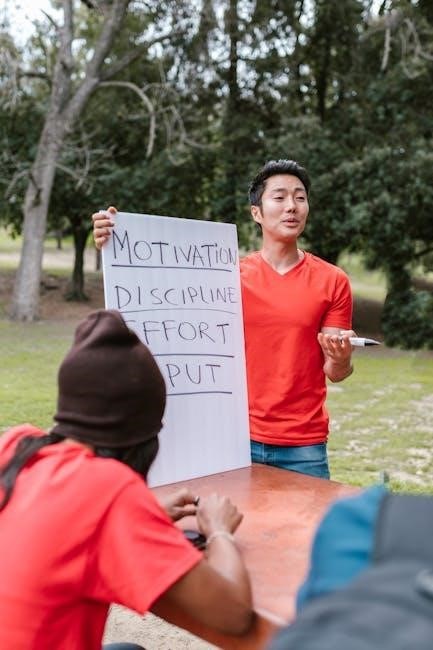Self-improvement is a lifelong journey of personal growth, focusing on enhancing skills, mindset, and well-being to overcome limitations and achieve a fulfilling life through continuous learning and self-awareness.
Understanding the Concept of Self-Improvement
Self-improvement is the practice of intentionally enhancing oneself through personal growth, self-awareness, and skill development. It involves recognizing areas for improvement and taking proactive steps to address them. This concept emphasizes the belief that individuals have the capacity to change and evolve, leading to a more fulfilling life. Self-improvement is not about perfection but about progress. It encourages individuals to embrace challenges, learn from failures, and cultivate resilience. By fostering a growth mindset, people can overcome limitations and achieve their goals. Self-improvement is a dynamic process that requires dedication, self-reflection, and a willingness to adapt. It empowers individuals to take control of their lives, develop emotional intelligence, and build healthier relationships. Ultimately, self-improvement is about becoming the best version of oneself through continuous learning and self-care.
The Importance of Self-Awareness in Personal Growth
Self-awareness is the cornerstone of personal growth, enabling individuals to understand their thoughts, emotions, and behaviors deeply. It allows people to recognize their strengths and weaknesses, fostering a truthful understanding of oneself. By cultivating self-awareness, individuals can identify negative patterns and thought processes that hinder progress. This awareness empowers them to make informed decisions and align their actions with their values and goals. Self-awareness also enhances emotional intelligence, improving relationships and communication. It encourages accountability and introspection, which are essential for meaningful change. Without self-awareness, personal growth becomes superficial, as individuals cannot address the root causes of their challenges. Therefore, developing self-awareness is a critical step in any self-improvement journey, leading to greater clarity, purpose, and fulfillment in life.

Developing a Growth Mindset
A growth mindset fosters resilience by embracing challenges and viewing failures as opportunities for growth, enhancing self-awareness and promoting continuous personal development and improvement over time.
Overcoming Limitations and Negative Thought Patterns
Overcoming limitations and negative thought patterns is crucial for personal growth. Recognizing and challenging unhelpful beliefs helps replace self-doubt with confidence. Reframing perspectives allows individuals to view failures as learning opportunities rather than setbacks. Negative self-talk, often rooted in past experiences, can be addressed through mindfulness and self-compassion. Embracing a growth mindset encourages resilience and perseverance. Practical strategies include journaling to identify patterns, seeking feedback, and practicing gratitude to shift focus from deficits to strengths. Building self-awareness and confronting fears empowers individuals to break free from mental barriers. By addressing these limitations, one can cultivate a more positive and empowered mindset, fostering sustainable personal development and a more fulfilling life.

Building Resilience and Perseverance
Building resilience and perseverance is essential for navigating life’s challenges. Resilience involves adapting to adversity while maintaining mental and emotional balance. Perseverance is the consistent effort to achieve goals despite obstacles. Developing these traits requires a growth mindset, embracing failure as a learning opportunity, and fostering self-discipline. Strategies include setting realistic goals, practicing mindfulness, and cultivating self-compassion. Overcoming negative thought patterns and limiting beliefs also strengthens resilience. Perseverance is sustained by focusing on progress, celebrating small wins, and maintaining a clear vision of long-term objectives. By building these qualities, individuals can better handle setbacks, stay motivated, and continue growing personally and professionally, ultimately achieving their aspirations and living a more fulfilling life.

Key Strategies for Self-Improvement
Key strategies include setting realistic goals, practicing self-discipline, and embracing failure as a learning opportunity to foster personal growth and a positive mindset through consistent effort.
Setting Realistic and Achievable Goals
Setting realistic and achievable goals is a cornerstone of self-improvement. It involves identifying clear, measurable objectives that align with your values and aspirations. Start by assessing your current situation and determining what you want to achieve. Break down larger goals into smaller, manageable tasks to maintain focus and momentum. Setting deadlines helps create accountability and ensures progress. Celebrate milestones to stay motivated and adjust your strategy as needed. Flexibility is key, as life’s challenges may require re-evaluating priorities. By setting realistic goals, you build confidence and develop a growth mindset, fostering long-term success and personal fulfillment.
Practicing Self-Discipline and Accountability
Practicing self-discipline and accountability is essential for fostering personal growth and achieving self-improvement goals. Self-discipline involves cultivating habits that align with your values and aspirations, such as maintaining a consistent routine, managing time effectively, and avoiding distractions. Accountability requires taking responsibility for your actions and decisions, ensuring you stay committed to your objectives. By holding yourself accountable, you build trust in your ability to follow through on commitments. This mindset helps you overcome procrastination and develop resilience. Regularly reflecting on your progress and identifying areas for improvement strengthens self-awareness. Over time, self-discipline and accountability become the foundation for sustainable growth, enabling you to stay focused and motivated on your journey to self-improvement.

Cognitive and Emotional Development
Enhancing cognitive functions and emotional intelligence fosters mental clarity, better decision-making, and improved relationships, leading to a balanced and fulfilling personal growth experience.
Enhancing Critical Thinking and Problem-Solving Skills
Critical thinking involves analyzing information objectively to form judgments. It requires active listening, questioning assumptions, and evaluating evidence to make informed decisions. Problem-solving complements this by identifying challenges, brainstorming solutions, and selecting effective strategies. Both skills are essential for personal growth, enabling individuals to navigate complex situations with clarity and confidence. By practicing these abilities, one can overcome cognitive biases, think creatively, and adapt to changing circumstances. Enhancing these skills fosters resilience and intellectual agility, crucial for achieving long-term goals and maintaining emotional balance. Regular mental exercises, such as puzzles or logical reasoning tasks, can sharpen these abilities over time.
Mastering Emotional Intelligence for Better Relationships
Emotional intelligence (EQ) is the ability to recognize, understand, and manage one’s own emotions and those of others. It plays a crucial role in fostering healthy, meaningful relationships. By cultivating self-awareness, empathy, and effective communication, individuals can navigate interpersonal dynamics with greater ease and understanding. High EQ helps in resolving conflicts, building trust, and fostering mutual respect. It also enhances active listening skills, allowing for deeper connections and more harmonious interactions. Developing emotional intelligence involves practicing self-regulation, which helps in maintaining composure during challenging situations. Over time, mastering EQ leads to stronger personal and professional relationships, improved collaboration, and a more positive social environment. It is a cornerstone of personal growth, enabling individuals to empathize, communicate effectively, and build lasting bonds with others.

Physical and Mental Well-being
Physical and mental well-being are interconnected, essential for a balanced life. Regular exercise enhances mental health, while proper nutrition supports cognitive function and vitality for personal growth.
The Role of Exercise in Improving Mental Health
Exercise plays a vital role in enhancing mental health by releasing endorphins, which reduce stress and improve mood. Regular physical activity helps combat anxiety and depression, fostering emotional resilience. It promotes better sleep quality, which is crucial for cognitive function and overall well-being. Studies show that even moderate exercise, such as walking or yoga, can significantly boost self-esteem and reduce symptoms of mental health disorders. Incorporating physical activity into daily routines can also enhance focus and productivity, making it easier to stay motivated and achieve personal goals. By prioritizing exercise, individuals can create a strong foundation for both physical and mental well-being, leading to a more balanced and fulfilling life.
- Reduces stress and anxiety through endorphin release.
- Improves sleep quality for better mental clarity.
- Enhances self-esteem and emotional resilience.
- Supports cognitive function and focus.
Make exercise a priority to nurture your mind and body effectively.
Nutrition and Its Impact on Cognitive Function
Nutrition significantly influences cognitive function, as the brain relies on essential nutrients for optimal performance. A balanced diet rich in vitamins, minerals, and antioxidants supports memory, focus, and mental clarity. Foods like berries, nuts, and fatty fish, high in omega-3s, promote brain health. Dehydration and poor dietary choices can impair cognitive function, leading to fatigue and decreased productivity; A diet low in processed sugars and saturated fats helps maintain sharp thinking and emotional stability. Proper nutrition also reduces the risk of cognitive decline and neurological disorders. By fueling the brain with nutrient-dense foods, individuals can enhance their mental capabilities and maintain peak cognitive performance throughout their lives.
- Berries and antioxidants protect the brain from oxidative stress.
- Omega-3 fatty acids from fish support brain cell health.
- Hydration is crucial for maintaining focus and mental clarity.
- Avoiding processed foods prevents cognitive fog and fatigue.
Nourishing your brain with the right foods is key to unlocking your full cognitive potential.

Building Healthy Relationships
Healthy relationships thrive on effective communication, empathy, and mutual respect, fostering trust and understanding while navigating life’s challenges together with open minds and supportive attitudes.
Communicating Effectively in Personal and Professional Settings
Effective communication is the cornerstone of healthy relationships, both personally and professionally. It involves active listening, clarity in expression, and empathy to understand others’ perspectives. In personal relationships, open dialogue fosters trust and intimacy, while in professional settings, clear communication enhances collaboration and productivity. Learning to articulate thoughts and feelings without judgment is key to building strong connections. Additionally, adaptability in communication styles ensures that messages are conveyed effectively, regardless of the audience. By mastering these skills, individuals can navigate conflicts, strengthen bonds, and achieve their goals more efficiently. Effective communication not only resolves misunderstandings but also fosters mutual respect and understanding, creating a foundation for lasting relationships.
Understanding Boundaries and Mutual Respect
Understanding boundaries and mutual respect is essential for fostering healthy and balanced relationships. Boundaries define the limits of what is acceptable behavior, protecting individual autonomy and emotional well-being. Mutual respect ensures that both parties value each other’s opinions, needs, and feelings. In personal relationships, boundaries prevent exploitation and promote trust, while in professional settings, they maintain professionalism and clarity. Respect involves acknowledging others’ rights and dignity, fostering an environment of empathy and understanding. When boundaries are respected, individuals feel safe and empowered, leading to stronger, more meaningful connections. Conversely, ignoring boundaries can lead to conflict, resentment, and emotional exhaustion. By prioritizing mutual respect and clear communication, individuals can build relationships rooted in equality and respect, creating a foundation for long-term harmony and growth.

Overcoming Self-Doubt and Fear
Overcoming self-doubt and fear involves recognizing negative thought patterns, reframing limiting beliefs, and embracing challenges as growth opportunities to build confidence and resilience.
Identifying and Challenging Negative Self-Talk
Identifying and challenging negative self-talk is crucial for personal growth. It begins with recognizing harmful thought patterns, such as self-criticism or catastrophizing, which often stem from deep-seated beliefs. Many people struggle with self-deprecating thoughts, like “I suck at this,” which can hinder progress and confidence. To challenge these, practice mindfulness to observe thoughts without judgment. Replace negative statements with balanced, realistic ones, such as “I’m learning and improving.” Reframing perspectives helps diminish self-doubt and fosters a more supportive inner dialogue. Additionally, setting small, achievable goals can build self-efficacy and reduce fear of failure. Over time, this process strengthens emotional resilience and promotes a healthier mindset.

- Recognize patterns of negative self-talk.
- Challenge unhelpful beliefs with evidence.
- Replace criticism with constructive affirmations.
Embracing Failure as a Learning Opportunity
Embracing failure as a learning opportunity is essential for personal growth. It allows individuals to gain insights into their mistakes, identify areas for improvement, and develop resilience. Many people view failure as a setback, but it is, in fact, a stepping stone to success. By analyzing what went wrong and adjusting strategies, one can turn failure into a valuable lesson. It’s important to adopt a growth mindset, understanding that setbacks are temporary and not reflections of one’s worth. Learning from failure fosters creativity, adaptability, and perseverance, all of which are critical for long-term success. Accepting failure as part of the journey encourages experimentation and innovation, ultimately leading to personal and professional development.
- View failure as a source of growth and insight.
- Analyze mistakes to refine strategies.
- Cultivate resilience and a positive mindset.
Sustaining growth requires continuous learning and adaptability, ensuring long-term success and a motivated future focused on personal and professional aspirations, embracing challenges and overcoming setbacks for a brighter tomorrow.
Sustaining Long-Term Growth and Development
Sustaining long-term growth and development involves continuous learning, adaptability, and resilience. It requires setting realistic goals and regularly assessing progress to stay motivated. Practicing self-discipline and accountability ensures consistency in efforts, while embracing challenges fosters personal and professional evolution. Building a support network and maintaining mental and physical well-being are crucial for enduring success. Overcoming setbacks through perseverance and positive thinking reinforces a growth mindset. By staying focused on aspirations and continuously refining skills, individuals can navigate life’s complexities with confidence. Growth is a lifelong journey, and sustaining it demands dedication, curiosity, and the willingness to evolve. Ultimately, long-term development is about embracing change and striving for improvement in all aspects of life, ensuring a fulfilling and purposeful path forward.

Staying Motivated and Focused on Your Goals
Staying motivated and focused on your goals requires a clear vision, consistent effort, and a positive mindset. Breaking down larger objectives into smaller, achievable tasks helps maintain momentum and track progress. Celebrating milestones, no matter how small, reinforces motivation and builds confidence. Surrounding yourself with supportive individuals who encourage growth can also enhance focus. Practicing self-discipline and avoiding distractions is crucial for long-term success. Additionally, embracing a growth mindset and viewing challenges as opportunities for learning fosters resilience; Regular self-reflection and adjusting strategies as needed ensures alignment with your aspirations. Maintaining mental and physical well-being further sustains energy and concentration. By staying committed and adaptable, you can overcome obstacles and remain driven toward your goals, ultimately achieving lasting success and personal fulfillment.
